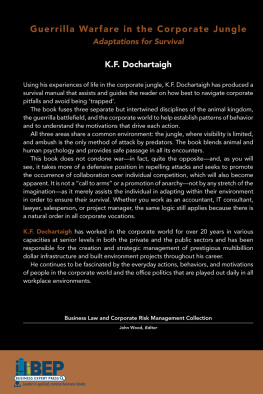has been asserted by him in accordance with the Copyright, Designs and Patents Act, 1988.
without written permission from the author.
About this book
This is a collection of the columns that I would most like to remember (and be remembered by) from the hundreds I have published over five decades in newspapers and magazines around the world.
The stories reflect the evolution of management style and company life and business travel from the telex and typewriter age of the 1960s and 1970s to cyberspace and the digital age of today.
They are based on my own roller-coaster business career from copywriter at a creative boutique in Lausanne for British international advertising agency Colman Prentis & Varley for mostly U.S. clients in Geneva; to become head of European marketing for Miles Laboratories, an emerging U.S. multinational; and group vice president responsible for business development for a Swedish health care company in Geneva; and finally headhunted as marketing and sales director for the British subsidiary of pharmaceuticals giant Merck Inc. of Rahway, New Jersey.
I became an accidental manager, I suppose, by default, by inertia, going with the flow, until I resigned from my last corporate job and moved to the South of France with the vainglorious notion of reinventing myself as a professional writer and broadcaster. I may have left a promising career behind me.
Arriving in Lausanne on that fateful day in September, 1961, I still thought I was destined somehow to fulfill my dreams of being a poet and actor both precarious occupations even in the heady 1960s. And believe it or not, it was a slim volume of poetry that got me the job at CPV, then the largest and most prestigious British international advertising agency, without any experience as a hidden persuader.
Some of these stories are earnest disquisitions on management, though usually with a satirical spin; others are thinly disguised fictional vignettes from my checkered career where you will meet a cast of characters: the Chairman; the Welshman; Guratsky; the bitch-goddess Helen, my secretary; Sammy Kalbfleisch; Mel Geist; and Stanley Zilch, the crazed soothsayer of Blue Skies Research in Broken Springs, Colorado.
Satire is a serious business not least because good satire is almost indistinguishable from reality. This is why satirists are always in danger of being overtaken by real life. Imagination is reality. You could never imagine how many cracks my crystal ball has sustained over the years.
Writing satire is a dangerous game too, especially if you are an executive in a multi-national company, fouling your own nest as one colleague pointed out with a touch of Schadenfreude.
And indeed, I was always treading what Graham Greene described as the dangerous edge of things. I came close to a heresy trial and execution on several occasions. Some of my more subversive pieces were published when I was safely ensconced in the South of France.
Whether managers are more fulfilled, more secure, more effective, than they were in the 1960s and 1970s is an open question. Have relationships within organizations improved or become more stressful?
Much has changed, of course: technology not only enables, but requires managers to be totally wired at all times, so that business travelers now have two jobs, one on the road and one fighting their corner back in the office. Thanks to the U.S.-led post-9/11 War on Terror and the age of mass tourism, business travel has become more onerous and less fun. Airports have become the slowest common denominator of air travel.
Instant communications in the form of smart phones, iPads and a raft of mobile devices have brought new challenges. It is impossible these days, or at least stubbornly eccentric, to be plausibly out of touch on the road. The old lament, Im sorry, I couldnt get to a phone or: The hotel didnt give me the message, would meet these days with bemused incredulity.
It is hard to imagine today the appalling frustration at being incommunicado at airports and during trans-Atlantic flights. I still shudder when I recall a delayed flight with fellow execs milling around the transit desk, silently screaming, A phone, a phone, my kingdom for a phone!
Thanks to the Internet, even a small local company can market its products and services worldwide. Viral marketing, diffusing awareness through social media is a new buzzword. Who remembers old buzzwords and the how to books: the Three-minute manager; In search of excellence..?
Organizations have changed over the years. Job security has disappeared, even in the so-called blue-chip companies. The executive proletariat is learning to adapt by exploiting new portable skills and seeking fulfillment in portfolio careers. Loyalty is a delusion; no longer a two-way street.
Globalization has seen the transformation of companies from the old export-led by the so-called international divisions of U.S. companies to domesticated companies in several countries, often losing their original national identities.
Back in 1970, I wrote a teaching case study for Harvard Business School, Chameleon Corporation describing the evolution of a medium-size family company in the Mid-West of the United States from exporting through local distributors around the world to being a truly international corporation with domesticated operations in major markets. This led to a so-called matrix management involving shared responsibility between local or regional, general managers, with P&L responsibility within their legal entities, and reporting to the international vice-president president; and area-based international product line managers, with P&L responsibility for the fortunes of their divisions, reporting to division vice presidents back at the corporate Kremlin: A recipe for bedlam and strife, not to mention fear and loathing throughout the organization.
Kinetic equilibrium is how my erstwhile chairman described it.
But it illustrates a crucial reality of management today: typically managers in most organizations have more responsibility than authority. They have to get things done through other people who do not report directly to them.
Management is always re-inventing the wheel. The IT revolution has helped to strip out layers of middle-management to create flatter hierarchies, with business units as semi-autonomous profit centres and a stripped down headquarters unit. Entrepreneurship, or rather intrapreneurship, was the name of the game. As management gurus came and went, corporations centralized and decentralized every so often in seismic restructuring.
The earliest of these pieces appeared in German translation in Werbung/Publicite, the bilingual monthly magazine of the Swiss Advertising Association, in German and subsequently, as a monthly page in English. A few early whimsical pieces were published in the old miscellany page in The Guardian in the 1960s.
Others were published in Chief Executive; five notoriously appeared on the op-ed page of the Wall Street Journal in 1984; some first appeared in my weekly column The Frequent Traveler, which ran for 23 years (1985 to 2008) in the International Herald Tribune; some I voiced for Business Matters on the BBC World Service. Thirty-nine stories were collected in my first book, If My Boss Calls, Make Sure You Get his Name, published in 1984; many of them are republished here.












